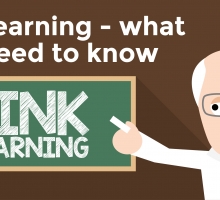If you find that you have a sudden drop in traffic to your website, then you could have been hit with a Google Unnatural Link Penalty. If this happens, the most important things to do are to find out why this happened and what you need to do to remedy the situation.
What is an unnatural link?
Google has very specific details within their Quality Guidelines which explains the meaning of the term unnatural link and how webmasters can fall foul of their creation and use:
“Creating links that weren’t editorially placed or vouched for by the site’s owner on a page, otherwise known as unnatural links, can be considered a violation of our guidelines.”
Google then continue to make an over-arching statement that “any links intended to manipulate PageRank or a site’s ranking in Google search results may be considered part of a link scheme and a violation of Google’s Webmaster Guidelines.” The use of the word ‘any’ means that anyone who has created any kind of unnatural link could be at risk of action from Google.
One way Google ranks websites, is by counting the number of ‘votes’ your website receives from external sites – the Google algorithm is made up of many factors, but in very broad terms the more high quality, relevant links from other sites your website has, the higher your website should appear on search engine results. These days, Google can analyse whether you have high quality links or poor ones – and the poor ones are known as unnatural or “spammy” links. Please note that having 10 links from one site, is not the same as having 10 links from 10 different domains. Google only counts the first anchor text link from a site and no value will be passed from the second or third links from that site.
Unnatural links can be created in a number of ways by a webmaster but they are not seen by Google as a true vote for your site. They are discarded by the search engine algorithm so that they do not count towards your position in the search results and if there are a large number of unnatural links, this can easily lead to a link penalty. Google also look at the quality of the sites which are linking to you and if they feel they are low quality, this will also count against you. They trust certain kinds of sites more than others as well as sites which are similar to yours. If they can’t see ‘votes’ from sites which are your peers, they may want to look a little more closely at who is linking to you. However, care needs to be taken here that it is not a straight exchange of you and similar sites just liking each other for the sake of increased popularity; Google will spot this too and this violates their guidelines.
What is an Unnatural Link Penalty
An Unnatural Link Penalty is where Google have decided that you have a number of unnatural links to your website. They will penalise your site, or pages on your site so your website drops dramatically in the search engine results and so in turn the amount of traffic also drops almost immediately because it’s difficult or impossible to find you on Google.
Google is constantly evolving and they now have sophisticated and intelligent algorithms which mean they are becoming very adept at only counting links which are of true value to people.
How will I know if I’ve received an unnatural link penalty?
To confirm that your suspicions are correct and you have received a link penalty, have a look at your Google Webmaster Tools profile for a message to say that you have been affected by ‘unnatural inbound links’. If there is no message and your ranking and traffic have dropped dramatically, please contact High Impact and we can perform a website analysis to determine the cause of your drop in rankings.
Are there any other kinds of penalty Google can issue?
There are other penalties Google can issue but these are less common. One of the most common is called a manual spam penalty and is given for a situation Google calls ‘pure spam’. This happens when it is felt that all or part of your website is spam and you have used one or a number of techniques designed to manipulate your ranking. These techniques can include cloaking, scraping content from other websites or that you are automatically generating text which makes no sense. Receiving this penalty means immediate action is needed and if you have been spamming, it has to cease. If however, you are not guilty of any of the tactics outlined by Google, the best idea is to undertake a full website SEO audit. This will look at all your pages, your links and those who link to you. After you’ve got to the root of the problem you can start to look to recover your ranking position.
There are other manual penalties which Google can – and do – issue for a range of specific violations. The reasons are often outlined in the message received but if there is nothing detailed it is time to look in detail at what is going wrong.
What is an algorithm update?
An algorithm is a complicated set of mathematical instructions. They instruct computers how to carry out and successfully achieve set tasks. Google uses algorithms to decide how high a website should be ranked. On a number of occasions over recent years, they have updated their algorithms and this has caused great concern for some webmasters as they have seen a great change and drop in their position in Google. There have been some major algorithm updates called Penguin, Panda and Hummingbird over the last couple of years which have seen very visible ranking changes. As well as these well publicised actions, Google often carries out smaller algorithm changes which can also affect your traffic and ranking.
Is this not the same as a penalty?
Being affected by an algorithm update is not the same as a penalty. Google is making changes and refinements to the way it works on an almost daily frequency so if these were all called penalties they would be impossible to categorise. Some of the changes affect some and not others and there are those which go unnoticed by the majority of webmasters. The key to knowing if you’ve received a penalty is to check your Google Webmaster Tools for a message.
Why have I received an unnatural link penalty?
If you’ve received a message which confirms that you have been penalised, Google may detail the issue and how you can get back on track. Many times though they don’t go into this much detail and so you need to look at your actions over the past months and years to see if you can discover where the problem lies. There are a number of examples of how a penalty may have come about:
-Making a donation in return for a link from their site to yours
If you make a financial donation to a small charity or perhaps a sports club and they say thank you and mention you on their website with a link, this isn’t an issue. If you decide to donate small amounts of money to a large number of sites who publically list their donors, this could be viewed as a violation by Google as you are not getting a true ‘vote’ from the site you are donating to and this action may appear unnatural.
-Sending a free item in return for an online review
If you send free samples or new products to bloggers and ask that they give a review on their site in the hope they will mention you with a link, this could well cause Google to issue you with a penalty as you’ve not created a natural link from the blogger. Whilst the person doing the review has done nothing wrong, the creation of a sudden large number of links to your website because of your activity could be frowned upon.
-Excessive mutual appreciation link exchanges
In the past, exchanging links with all blogs or sites with a similar theme to your own helped with ranking. This is not the case now and saying that you’ll put a link on your site to theirs in return for them returning the favour can set alarms ringing with Google.
-Guest posts and articles with keyword –rich anchor text links
If you have used a large number of articles with keyword anchor text links this could incur an unnatural link penalty. Google looks out for any articles it considers suspicious and doesn’t differentiate between low or high quality content. If you have articles with words containing links and the words themselves aren’t relevant to the article, this is almost definitely a reason you have incurred a penalty. Google also seem to look at quantity but aren’t definitive on this issue, so take care in the number you place.
-Buying large numbers of links
There are numerous companies who offer large numbers of links for sale for very low cost. Their service will utilise automated software to search for sites which accept spam links; for example as fake forum ID posts or as spam guest comments.
There are a number of other reasons a penalty can be issued; text adverts, advertorials which contain unnatural links, links in widgets, links in footers, the use of low-quality directories or forum posts which contain links in the signature. This could be referred to as “black hat SEO”.
Penalty removal
An unnatural link penalty from Google can take some time to recover from especially if you try to resolve these issues in-house, but it can be done through a combination of data gathering, communication, audit and perseverance. Working with a specialist company like High Impact can accelerate the recovery time. We have removed penalties from websites with smaller link profiles within two weeks.
The first thing to do is to look to gather as much information as you can about links you know about. You can find out more from your Webmaster Tools. Keep all the data you find in a spreadsheet with details of the URL, the site and the history of requests for removal. This will supplement your communication with Google that you have tried to make as much effort as possible to resolve the situation. Contact each webmaster who has a link to you on their site and ask that they remove it. After you’ve done this, contact Google with your data and a disavow request to any links you are unable to control. For an in-depth analysis on Penalty Removal read our “Seven Steps to Removing a Google Penalty” post where we take you through in detail how we remove a penalty. If you are struggling to remove a penalty, please contact High Impact so that we can assist you.
Whilst you can’t predict what tweaks Google are going to make next to their algorithms, you can look to try to stay ahead of any possible penalties by ensuring your SEO techniques are natural and don’t bring you into the limelight in the future. Having a penalty removed is possible if you have the required knowledge and follow the correct process, or by talking to experts who can resolve the situation and get your site ranking again.
Author: Julian Saunders is the founder of High Impact.
You can find on him on Google + here.






